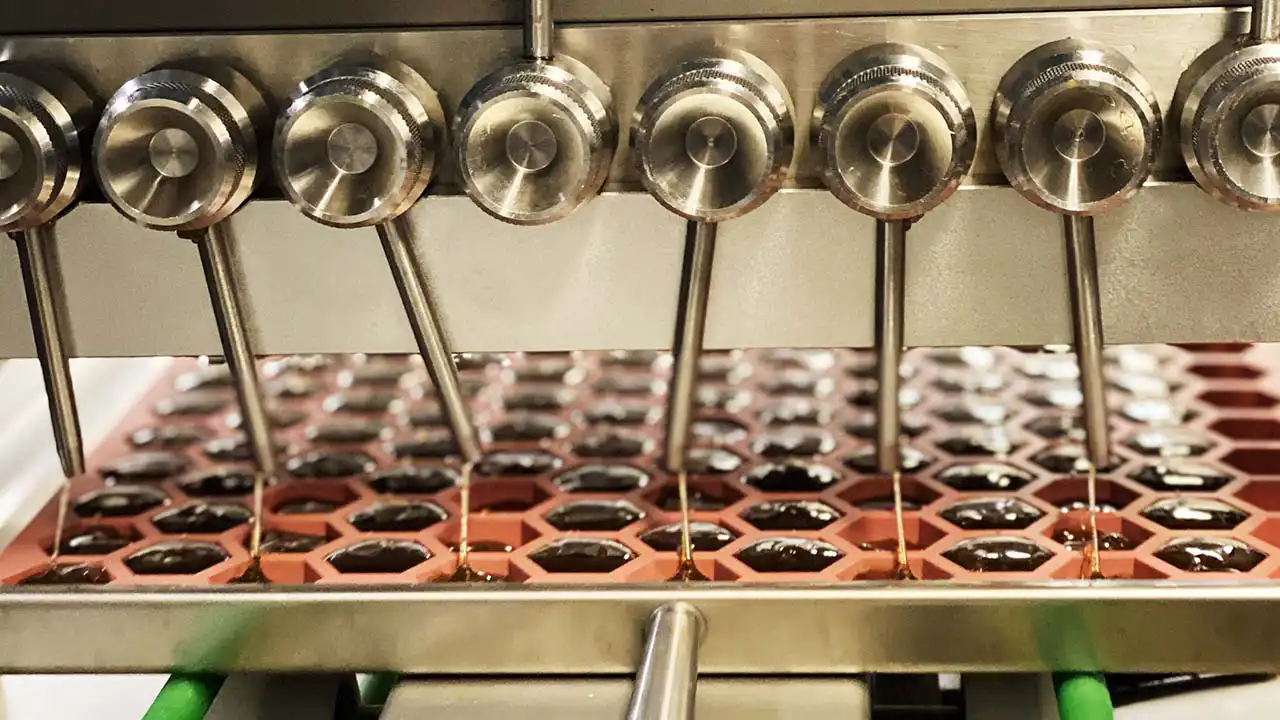Economists following state-regulated marijuana markets believe consolidation is inevitable and that U.S. consumers eventually will see the same handful of brands at every retail outlet.
But three Colorado companies that produce cannabis-infused gummies prove there is still room for newcomers in the nation’s oldest adult-use marijuana market – not simply to compete with nationally recognized brands but to innovate and grow.
“We’ve seen data that we’re the No. 2 gummy brand by volume,” Ripple Chief Revenue Officer Missy Bradley told MJBizDaily.
Commerce City, Colorado-based Ripple is the state-licensed cannabis manufacturer behind Ript, an infused gummies brand that launched in November 2022.
“It’s more than 50% of our business at this point,” Bradley said, adding that the company produces more than 1 million servings of Ript per month.
To carve out market share, product manufacturers believe newcomers must have something distinctive to offer consumers – be it a new product format, deliberate pricing or partnerships with respected cultivators.
Launching a new cannabis product
Ripple has pivoted several times since Bradley and her co-founders first started working on a low-THC tea for Colorado’s new adult-use market in 2014.
After the company launched Ripple, a water-soluble THC powder that can be added to beverages, in November 2016, the product “quickly became what we were known for,” Bradley said.
Today, the brand’s product lineup includes:
- The original Ripple dissolvable powder.
- Ripsticks, a line of flavored powders similar to Pixy Stix.
- Riplets, a line of cannabinoid-infused, pressed pills.
- Ript Gummies, a low-cost gummy for edibles consumers.
“The Colorado market told us time and time again, ‘We don’t want micro-dose, we want full-dose gummies,’ and our response to that was Ript,” Bradley said.
Cutting costs for consumers
Ripple already had the technology to create a consistent, fast-acting gummy when executives considered entering that edibles category.
Where Bradley and other Ripple executives felt they could compete was on price: The manufacturer’s suggested retail price (MSRP) on a pack of 10 Ript gummies containing 10 milligrams of THC each is $6, Bradley said, adding that the top brands sell packages of 10 gummies for $15-$20.
“We felt there was a huge gap in terms of the savings that manufacturers had experienced over the years – the prices of THC had dropped dramatically, and CBD, all the other minor cannabinoids as well – and those costs were not being passed on to the consumer by other infused products manufacturers,” Bradley said.
Ripple executives believed if they could get consumers to try Ript based on price alone, they would return to the product for its consistency and effects.
But to get there, Ripple had to understand its costs, from ingredients to machinery, supply chain and staffing, which Bradley said is Ripple’s No. 1 expense.
“We can’t replace people and technology with machinery, but we can use it effectively,” she said.
To cut costs and deliver the most savings to consumers, Ript launched with a bare-bones marketing and packaging budget.
“When we launched, Ript was scrappy,” Bradley said, adding that the original labels were hand-drawn and had smudges on them.
“The idea was that the money was in the gummy, not in the packaging.”
Rosin-infused gummies a game changer
Rosin was considered a high-priced, premium product in 2020, when Dialed In launched a line of rosin-infused gummies in Colorado.
When Max Vansluys, president of Dialed In, joined eight months later, the company was producing 6,000 units per week and had a 100-store waiting list.
“We really had to ramp up production to try to not lose a lot of this market share that we were gaining very quickly,” Vansluys said, adding that the company was operating under a manufacturing agreement and did not yet have its own license.
Ultimately, Dialed In had acquired a manufacturing license and was producing roughly 22,000 gummies per week when it purchased its own facility and was able to rightsize production with market demand.
“To separate ourselves from Wana and Wyld, we focused on being a small-batch, single-strain edible manufacturer,” Vansluys told MJBizDaily.
Rosin edibles and being solventless proved to be a key differentiator for Dialed In, as many other brands were made with either ethanol or butane extraction, Vansluys said.
Forging cannabis partnerships
Rather than accept outside capital, Dialed In bootstrapped its expansion with partners such as Boulder, Colorado-based marijuana cultivator and retailer 14er.
“We couldn’t afford to buy our own biomass at the very beginning, so that’s how the collaboration model came into play,” Vansluys said.
In exchange for 6 pounds of trim, Dialed In gave 14er finished gummies to sell in its store.
“That model ended up becoming our business; more and more grows started to reach out because we were the only brand that would do co-branded labels,” Vansluys said.
In addition to identifying the grow and cannabis strain that goes into each tin of gummies, Dialed In creates a unique name and label design for every batch.
Since its inception in April 2020, the company has created more than 2,600 unique batches, and once a batch is sold out, that’s it.
“It created a scarcity model, where people were going out and just buying them when they could,” Vansluys said.
“Because unfortunately, at the beginning, we couldn’t make them fast enough, so there were times when they just weren’t on shelves.
“We were able to solve that over time by getting our own license and expanding our operations.”
New brand: Flower Union
The latest entrant into Colorado’s cannabis-infused gummies category introduced a product surprisingly absent from the nation’s oldest adult-use market: a weed edible that tastes like weed.
Jon Spadafora’s chance meeting at MJBizCon with Azuca CEO Kim Sanchez Rael came full circle in November, when Spadafora officially launched Flower Union.
The newcomer’s line of gummies is made with Whole Plant Activator from New York-based Azuca.
After delivering its initial batches of gummies to marijuana retailer Telluride Bud Co. in early November, Flower Union ended 2024 with its product for sale in 15 Colorado-licensed marijuana retailers.
“The most important feedback we’ve received is that stores that ordered have all reordered; reorders have gotten bigger every time,” Spadafora told MJBizDaily.
Specks of bud a differentiating factor
Flower Union gummies contain zero artificial flavors or colors, but they are far from devoid of flavor and color.
Instead, the gummies range in color from green to purple to red, depending on the decarboxylated flower each batch contains.
Unlike other gummies, Flower Union edibles contain visible flecks of bud, and Spadafora said the cannabis-based flavors range from Kush to tropical fruit.
“It always goes back to the terp content, the flower going into it,” he added.
In a cannabis market where consumers have come to expect Starburst-flavored edibles, Flower Union has had to double down on education around the product.
“There’s been a lot of shift and change in how we educate the consumer,” Spadafora said.
“It’s highly unlikely that (budtenders) were going to give the same spiel as I did, and oftentimes there was no spiel.
“The feedback came out, ‘Wow, that really tastes like flower.’ And so, we worked on an education platform and said, ‘Yeah, it does. We want it to taste like flower.’”
The team took that feedback and revised the sales process to include Flower Union-branded marketing materials that budtenders can read and share with consumers.
“Since doing that, we haven’t had a single comment about being surprised” by the flavor, Spadafora said.
Another differentiator: Azuca’s Whole Plant Activator is intended to provide Flower Union consumers with a more predictable onset and offset of each gummy’s effects.
Cannabis market expansion
Spadafora has solidified partnerships with licensed cultivators in New Jersey and plans to launch Flower Union there later this year.
While New Jersey launched adult-use sales in April 2022, Spadafora said consumers there became educated about cannabis faster than their Colorado counterparts because regulators and businesses were able to leverage lessons from other states.
For example, while mocking up labels for the New Jersey market, the Flower Union team learned that state requires each product’s top three terpenes to be listed on the label – something not required in Colorado.
“We love that; we want to do that anyway,” Spadafora said.
2024 MJBiz Factbook – now available!
Exclusive industry data and analysis to help you make informed business decisions and avoid costly missteps. All the facts, none of the hype.
Featured inside:
- Financial forecasts + capital investment trends
- 200+ pages and 49 charts highlighting key data figures and sales trends
- State-by-state guide to regulations, taxes & market opportunities
- Monthly and quarterly updates, with new data & insights
- And more!
Dialed In enters Ohio market
Another company taking its learnings from Colorado to a new state is Dialed In, which made its first deliveries to Ohio retailers in mid-December.
By early January, Vansluys said, some stores had run out of gummies and requested more.
Unlike in Colorado, where each tin of gummies contains two flavors, Dialed In stuck with one flavor per tin in Ohio to make production easier.
In addition to introducing 12 top flavors from Colorado in the Ohio market, Vansluys said Dialed In’s team in Ohio is prioritizing consumer education.
But this time, there is a more robust marketing budget.
“It really was a boots-on-the-ground campaign in Colorado at the very beginning,” Vansluys said.
“We didn’t necessarily have the resources or the people in Colorado to do (consumer education) right away, whereas we’re making sure that we have that in Ohio.”
Kate Lavin can be reached at kate.lavin@mjbizdaily.com.
Medical Disclaimer:
The information provided in these blog posts is intended for general informational and educational purposes only. It is not a substitute for professional medical advice, diagnosis, or treatment. Always seek the advice of your physician or other qualified healthcare provider with any questions you may have regarding a medical condition. The use of any information provided in these blog posts is solely at your own risk. The authors and the website do not recommend or endorse any specific products, treatments, or procedures mentioned. Reliance on any information in these blog posts is solely at your own discretion.






